Kiah Wilson never felt represented in her education. As a Black woman growing up in Auburn Gresham on Chicago’s South Side, Wilson was reflected in her community and student body, but never in the various curricula presented during school. Throughout elementary and middle school, and up to her 2016 graduation from Kenwood Academy High School, which had one Black history elective, she realized that more was taught about the history, excellence and accomplishments of white people rather than of people of color.
With a promising scholarship and a desire to be closer to her family, Wilson transferred from the University of Southern Indiana to DePaul University in Autumn Quarter of 2018. That was when she met Lisa Calvente, a tenure-track assistant professor in communication and performance studies, whose intercultural communication course (CMN 103) she called a “breath of fresh air.” She found solace in knowing a faculty member in the college who supported DePaul’s students of color.
“To have a professor like Dr. Calvente teaching on these topics and on these ideas and these theories, it really, really helped empower me and actually helped me get a better sense of racial relations as it relates to myself and as it relates to other communities,” Wilson said.
A specialist in issues surrounding the Black Diaspora and anti-Black and -Brown racism in the United States, Calvente taught a variety of communication studies courses, a program under the College of Communication. As of 2018, Calvente had taught 14 classes in undergraduate, graduate and cross-course levels.
While all of her courses dealt heavily with race, a topic Calvente felt motivated to teach as a woman of color, CMN 103 was a particularly important course because it was required by the College of Communication for all students.
Since Calvente began her tenure-track position at DePaul University in 2011, she faced repeated pushback from tenured evaluators, resulting in multiple “recommendations for termination” from the College of Communication. Embedded in various documents collected from 2015 to 2020, provided to 14 East by Calvente, are comments of concern from tenured faculty about the theoretical readings and the uncomfortable discussions of race, which are based on student evaluations, class observations and interviews cited in her reviews. After a nine-year fight to earn tenure, Calvente will no longer be teaching at DePaul as of June 30, 2020, a decision that pushed some DePaul students to demand answers through a petition and public statement.
The DePaulia first reported the news of Calvente’s termination earlier this month.
While Calvente provided documentation of her tenure process, she declined to speak on the record due to her pending lawsuit.
“I’m angry that DePaul took away the opportunity for other students to learn in her classroom,” Kellie Stonebrook, a junior in communication studies, said after receiving Calvente’s mass email.
The email inspired Wilson to create a petition calling for the university to reverse its tenure and termination decision. The petition has received 2,777 signatures as of June 19 and is growing.
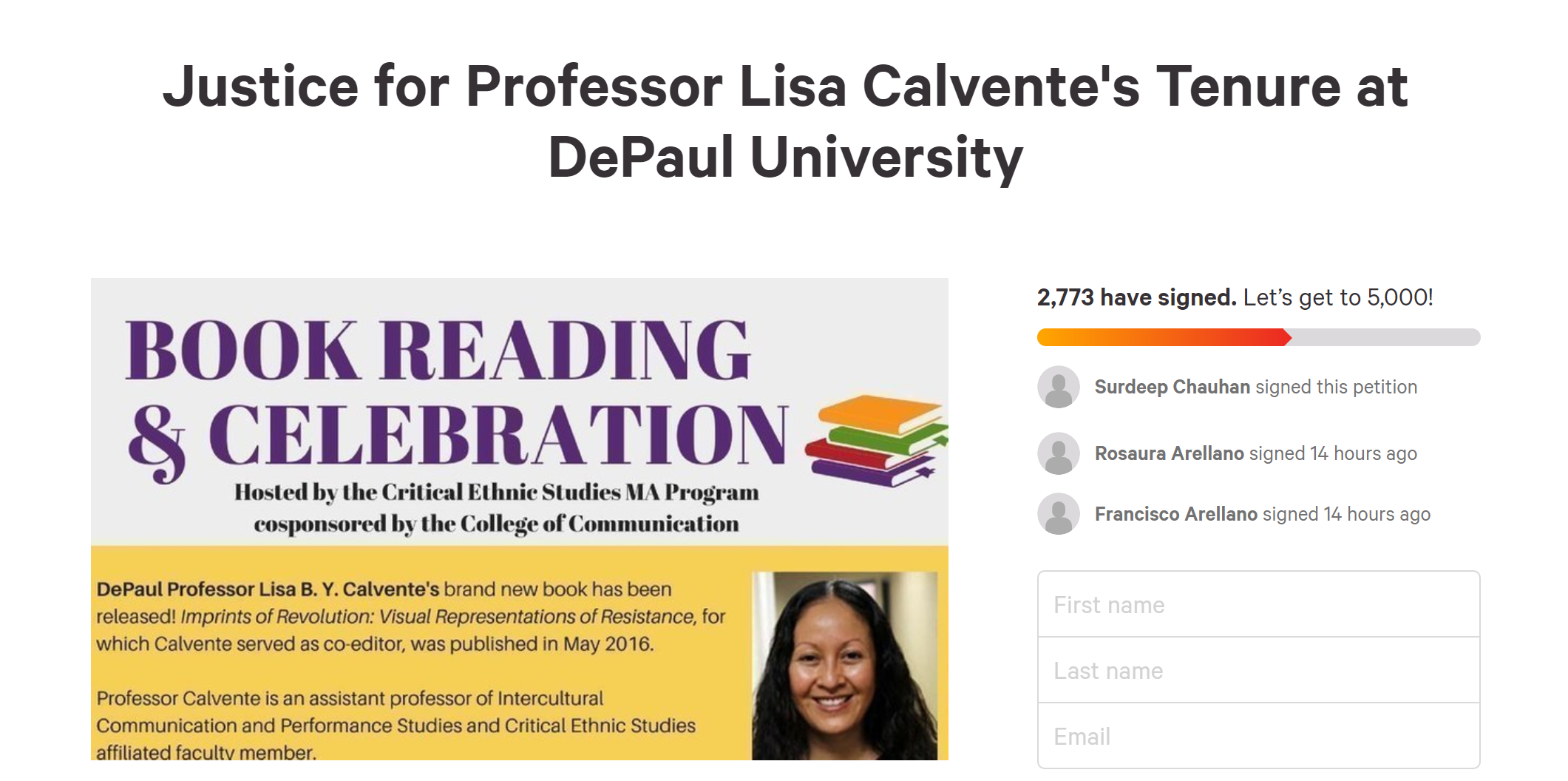
Change.org petition for Calvente’s tenure process at DePaul University from June 17
14 East reached out to all faculty tenured at the time of Calvente’s final tenure review, some non-tenured faculty members in the College of Communication, Dean Alexandra Murphy and Interim Provost Salma Ghanem. Some declined to comment on Calvente’s tenure, process and decision due to confidentiality policies while others did not respond.
Murphy commented on the student response to Calvente’s termination, saying, “In the College of Communication, we encourage students to use their voices to advocate for themselves and others. Given this, I am not surprised and deeply respect that students are advocating so passionately for an instructor who has made such a powerful impact on their lives. They are seeking to hold an institution accountable for a decision that they do not understand and a process that goes beyond what they experienced in the classroom.”
Ghanem declined to comment, stating that “because this a personnel matter and currently under litigation, I cannot comment or respond to your questions.”
But students still feel as though Calvente’s case does not reflect DePaul’s mission of fostering an inclusive campus environment for faculty and students.
“What’s happening to her right now is literally the prime example of everything that she taught us,” said Yesica Tellez, an alumna of communication and media studies. “Of her being a source of truthfulness, of challenging the powers that be, of calling out oppression, calling out injustices, calling out bigotry, racism, all of it.”
To understand the present moment for Calvente, it is paramount to first understand the often-difficult journey of acquiring tenure.
A breakdown of the tenure process
A tenure-track contract is like a board game: there are ways to pause, take extra laps and be sent back to square one at a new university. The process begins when a professor gets a contract at DePaul to be a faculty member on the tenure track as an assistant professor. In that contract, they agree to a probationary period that can be a maximum of six years, where they are subject to annual reviews, according to Chapter 3 of the Faculty Handbook.
The first level of review is within a faculty member’s unit, which includes reviews from tenured faculty belonging to the professor’s specific department; in Calvente’s case, that was the College of Communication, as the college has no departments to use for unit reviews. The faculty member goes through at least two formal reviews to prepare them for their final tenure review. During local unit reviews, tenured faculty representing the college interview the faculty member, measure their progress based on their documented performance, and offer feedback on the three areas they will eventually be evaluated on: teaching, research and service.
“The tenure process is complex, and the tenure review looks at the full range of a professor’s job, from teaching to research to service,” said Paul Booth, a professor of media and cinema studies at DePaul. “Students only really ever get to see the teaching part, but a faculty member’s job is much more than just what students see in the classroom.”
A professor’s teaching is evaluated on their command of the material, communication, methodology for evaluating student work and more, demonstrated through student evaluations and faculty observations (Handbook Chapter 3.4.2.1). Research relates to published written findings, editing of publications and presentations a faculty member has done to contribute to their field at large, while service refers to a professor’s contribution to unit and university-level committees, events and community service. In each of these three areas, the reviewing committee ranks the faculty member’s performance on a scale of “not satisfactory, satisfactory, good, very good, excellent.”
As a system with built-in checks and balances, the dean has the choice to follow the college’s recommendation or overrule it. In Calvente’s case, faculty participating in her 2015 formal college review voted 6 to 1 in favor of termination. The larger committee of 18 tenured College of Communication faculty agreed with the decision. However, then-Dean Ghanem went against the college’s advice and kept Calvente on a tenure track.
When college faculty voted 13 to 8 in favor of terminating Calvente’s contract in her 2017 formal review, Ghanem overruled their recommendation again.
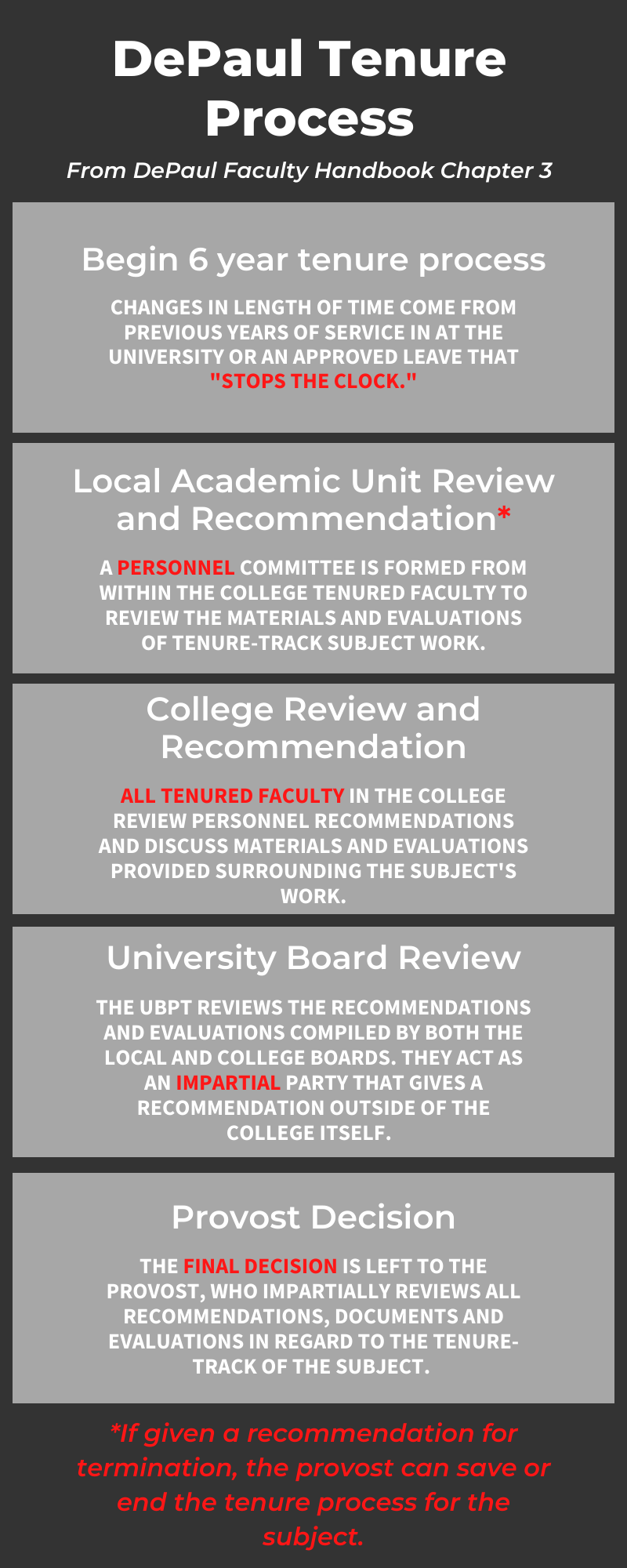
Graphic by Marin Scott, 14 East.
After passing formal reviews with personnel committees, the faculty member is evaluated by tenured professors across the college to discuss whether the faculty member meets the college’s expectations in each area. For the College of Communication, faculty are expected to be deemed “excellent” in at least two of the three areas to get tenure.
In 2018, Calvente’s performance was assessed to be “very good” in all three areas in her tenure and promotion review by college faculty, who voted 19 to 2 in favor of termination. After this, the dean writes her own recommendation, and the faculty member can respond to their final tenure review before all materials are presented to the University Board on Promotion and Tenure (UBPT), yet another form of checks and balances. This committee’s role is to provide a wider, impartial perspective with representatives from most of the colleges (seven in total, including the College of Communication) voting based on the materials.
In Calvente’s case, the UBPT voted 4 to 3 in favor of tenure in 2019, noting that the majority of board members found her course evaluations overwhelmingly positive, the CMN 103 curriculum appropriate and research and service sufficiently “excellent,” while the dissenting minority expressed lingering concerns in each of these areas. This report and all other recommendations were sent to now-Interim Provost Ghanem, who ended Calvente’s contract due to the “slim majority” of UBPT votes in favor of her, in comparison to the majority of College of Communication faculty who voted against her (Provost Letter p. 1). In defending her decision to keep Calvente in 2015 and 2017, Ghanem wrote that she didn’t disagree with the College of Communication’s evaluation of Calvente; rather, she wanted her to have an opportunity to grow.
At this point in the tenure process, the faculty member is faced with a choice: find another job or fight the decision in an appeal. Calvente chose to fight.
In the appeal, the burden of proof rests on the faculty member to present their case (Handbook Chapter 5.1.1). The professor can appeal on multiple grounds, including that the process 1) “violated the faculty member’s academic freedom,” 2) deviated from the handbook and college guidelines or 3) was the result of discrimination defined by university policies and laws (Handbook Chapter 5.1.2.3). Calvente filed an appeal with all three claims.
Calvente’s claims were then assigned to the Faculty Appeals Board, which completes a preliminary review with the faculty member in question to see if their claims are substantial and then conducts a full investigation.
After investigating all provided materials, the Board then sends their recommendation and all case documents to the university president, who has the final say in the tenure case. In 2019, President A. Gabriel Esteban ruled against Calvente, citing that the Board failed to prove that the College of Communication deviated from handbook procedures, which marked the end of Calvente’s employment at DePaul. With every avenue of action in the university exhausted, she looked outside the university for help. On June 10, Calvente filed a lawsuit against DePaul University and Interim Provost Ghanem for claims of discrimination and retaliation.
Differing standards, miscommunication and subjectivity
The results of the tenure process ultimately boil down to how reviewers view, weigh and vote on a candidate’s materials while following university and college guidelines for each specific case.
“When I say that there’s subjectivity, I want to be clear it’s not tricky or unspecified, it is literally subjective, because what is a significant contribution?” said Maria De Moya, an associate professor at the College of Communication and the diversity advocate for the college until June 30, 2020. Afterwards, she will represent the college on the Faculty Council Diversity Committee.
“But I don’t feel that there’s anybody in our college that is out to get anybody or is evil or whatever,” De Moya said. “I feel that we have very strong differences in opinion, and sometimes strong differences in what we think is the best for our students.”
The disputing opinions of UBPT members highlight how the same materials can be interpreted in different ways during the tenure process. The Appeals Board wrote that the 2018 review’s inconsistency in evaluations and unclear guidelines on how Calvente could progress toward tenure were substantial to her case.
Vinnie Cicchirillo, a former tenure-track professor in the College of Communication whose contract ended after his third year, was familiar with Calvente’s tenure case because they discussed their experiences while under independent review cycles. In his own tenure process, Cicchirillo appealed and received support from the Faculty Appeals Board; then-Provost Marten denBoer sided with the college in favor of termination. Cicchirillo is now an assistant professor of marketing at St. Xavier University in Chicago.
Calvente also disagreed with the 2018 review faculty’s interpretation of previous feedback and inclusion and assessment of her research. In her statement for the final tenure review, Calvente wrote that the college recommended delaying the publication of her book in an attempt to expand her research more quickly. This advice is seen in the 2017 formal review where tenure faculty recommended Calvente “further push her publication rate, particularly with more journal articles, to make up for slower output in prior years.”
Yet faculty in her final tenure review expressed disappointment that she had delayed book publication and not gained an offer on her manuscript. In her response, Calvente wrote that she “specifically asked if I needed the book for tenure with my record” and all committee members said “no.”
Calvente also submitted a link to a performance that was initially left out of her 2018 dossier. The dean asked for context and clarity as to the performance’s student involvement, which, if in high numbers, would have required it to count towards her teaching evaluation. Because Calvente did not provide the contextual materials in time for review, the College of Communication used her performance documents for teaching instead.
While the College of Communication’s guidelines on submitting performances as research make it clear that faculty reviewers may consider the context of performances in their evaluation, they do not clearly state that the professor under review needs to submit specific material to demonstrate this context.
“Public performances of creative work are evaluated on the basis of their engagement with communities and publics outside the classroom, and are also measured on the basis of scholarly reviews, and grants and awards relating to the work,” the college guidelines read.
When the Appeals Board looked into why the performance was left out of Calvente’s formal review, Murphy said it was an oversight and the rules did not say Murphy had to include every piece of research a professor submitted in the final materials for the tenure review (Appeal p. 11). Thus, the board classified the link’s exclusion as a “minor procedural error.”
The solo-authored book chapters, articles and collaborative research Calvente published were found to be not enough to be rated “excellent” by the college.
Calvente’s service also produced diverging interpretations by reviewers of the documents. As an intercultural communication and performance studies scholar, Calvente fostered relationships with related departments, including African and Black diaspora studies, Latin American and Latino studies and women’s and gender studies while still performing service within her own college. This included reviewing the CMN 103 syllabi of non-tenured faculty and participating in the college’s non-tenure track review board and the local review board.
The Appeals Board found evidence that Calvente received unclear guidelines about making progress in service toward tenure, citing the formal reviews in 2015 and 2017, a letter of recommendation written by Murphy (then a professor of communication and media) in 2016 thanking Calvente for “stepping up” to serve the college and participating on two “time-intensive” committees. They also included Murphy’s 2019 letter to the UBPT, which noted Calvente’s in-unit service played out mostly in ad-hoc opportunities and that she had been consistently recommended by faculty in reviews to serve more on “substantive” committees.
The Appeals Board wrote that “Dean Murphy mentions that the Appellant was advised to significantly increase her service to the College in more ‘meaningful’ ways in each prior formal review. A careful review of the 2015 formal review shows that there is no recommendation about ‘meaningful’ service.”
In Cicchirillo’s case, he also felt that the college’s expectations “were just not necessarily communicated” in his own review process. He said his Appeals Board document stated that his early evaluation gave little indication that he had substantial areas in which to improve, thus causing an unfair decision from the college.
Additionally, the Appeals Board found that Calvente did volunteer for in-unit service opportunities that were canceled or that she was not chosen to serve on. In all three areas of evaluation, faculty highlighted positive contributions Calvente made to the college and rated her as “very good” in her final tenure review. From Cicchirillo’s perspective, and similar experience, Calvente did the work to be rated “excellent.”
“I think Dr. Calvente’s case is particularly egregious, because she has done a lot of things that they asked her to do,” he said before mentioning that the devil is in the details, meaning that reviewers can keep their suggestions for improving and justifications for evaluating a professor at a specific level vague. This, coupled with the fact that UBPT and Appeals Board recommendations can be overturned by higher administrators, makes him feel like the system can be manipulated.
“It’s just one of those things where if they don’t like you and they want to get rid of you, they can,” he said.
“It’s just one of those things where if they don’t like you and they want to get rid of you, they can.”
Mischaracterizations of student evaluations and teaching style
Both the UBPT and the Appeals Board decisions determined that the College of Communication committee evaluations mischaracterized aspects of Calvente’s teaching and service. Furthermore, the Appeals Board ruled in favor of Calvente because they believed the College of Communication reviews deviated enough from the official process to influence their final tenure decision. But what were these deviations?
One major discrepancy hinges on the College of Communication’s claim that Calvente was frequently negatively reviewed by students through end-of-quarter evaluations, thus painting Calvente as an intimidating professor who made students uncomfortable. The Appeals Board found that students rarely brought this up.
“The Board was disturbed to discover that the 2015 formal review provided a highly selective, negative presentation of patterns in student comments, the review downplayed (almost to the point of willful distortion) positive aspects of the candidate’s teaching,” according to the Appeals Board (p. 13).
These claims began in 2015 with the seven-member personnel committee who reviewed Calvente, stating that “many students” suggested there was a “lack of encouragement” in the classroom (Appendix B1). Backing their point was a student evaluation from Calvente’s Winter 2014 INTC 308 course that said the “Instructor often made students feel inferior,” and made them “afraid to speak at all in fear of ridicule.”
In her later 2015 review with 18 representative faculty members of the College of Communication, Calvente was asked to defend herself against negative student evaluations, which they said showcased a “hostile” environment. She responded that as a woman and person of color teaching critical race theories, there would naturally be students who were uncomfortable.
“The ‘hostility’ in my evaluations is the result of the structural racism and the normalization of whiteness within the academy that unfairly scrutinizes faculty of color, primarily women, who do not reinforce the standards and norms of white (male) supremacy,” she said, according to the 2015 faculty review document (2018 Appendix B2). In her statement she includes a myriad of scholarship that suggests women of color leading classes are more likely to be scrutinized by students and be labeled as “intimidating” (p. 3).
In the 2017 review, the College of Communication wrote that Calvente had negative reviews every quarter and in more than 55 percent (five out of nine) of her course evaluations. When the Appeals Board looked into this number, they found that statistic misleading.
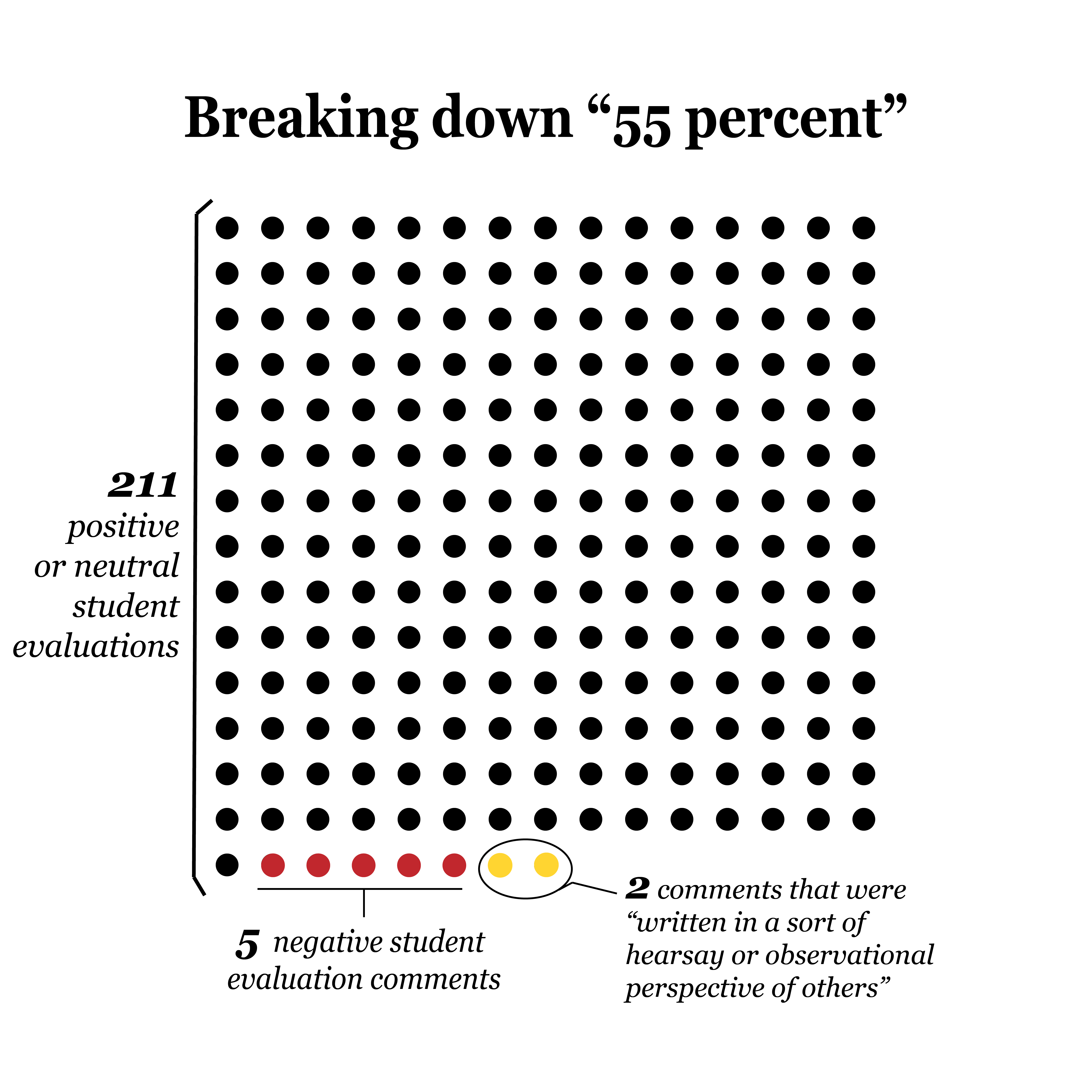
Graphic by Cam Rodriguez, 14 East.
In November 2018, Calvente emailed tenured journalism professor Hai Tran, who was identified as the chair of the personnel committee by Murphy in Appeals Board questioning, to ask about the origins of this number. Tran responded that it was “self-explanatory” and would not be included in her final tenure and promotion review (Appeal p. 15), though it was still cited in both the 2018 tenure and promotion review and Murphy’s letter to the UBPT in 2019. In her letter, Murphy used slightly different language, stating that “at least one comment that referenced intimidating and dismissive behavior was seen in 55 percent of her course evaluations.”
When asked to comment on his involvement in Calvente’s tenure process, including how the committee reached the “55 percent,” Tran did not respond.
After inspection, the Appeals Board found that seven of 218 student evaluations from Calvente’s nine courses during the review period were marked as negative and spread out over five courses, leading to the committee’s conclusion that negative comments existed in five out of nine, or 55 percent, of her course evaluations. Further, the Board found that two of the seven comments were not written based on their own negative experiences but from the perspective of hearsay about fellow students.
In the documents, the committee’s choice to focus on “course evaluations,” or assessments of one whole course, as negative could be confused with student evaluations, which would require 120 negative evaluations to reach 55 percent.
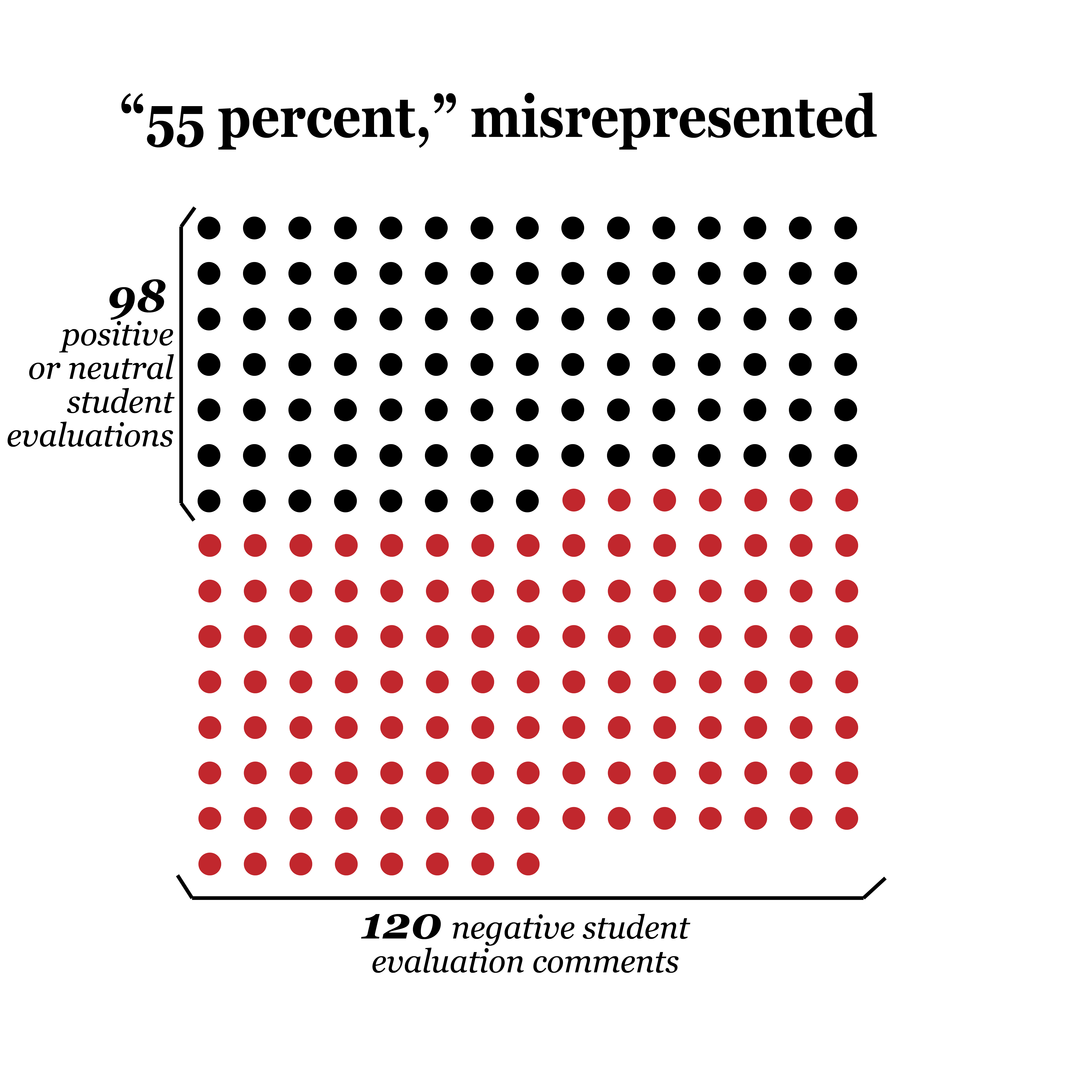
Graphic by Cam Rodriguez, 14 East.
De Moya disagreed with the Appeals Board’s claim that the “undue weight” that the college placed on Calvente’s student evaluations would not affect the teaching ranking during her tenure review.
“I think that’s factually inaccurate,” De Moya said. “We have three portions: research, service and teaching. And student evaluations are one key component of one-third of our work.”
Katie Adams, a DePaul journalism and public relations alumna who was in Calvente’s CMN 103 class, said that Calvente directly addressed ideas she saw as problematic, which may have been why some students saw her as intimidating.
“There really is an ethical question of treating everyone’s opinions like they’re equal when some people’s opinions contribute to violence and perpetuate violent ideas that will hurt people,” she said. “She shot down problematic ideas in the classroom. She thought that was responsible and I agree.”
A question of Vincentian values
In documentation of the 2015 College of Communication personnel committee, some tenured faculty repeatedly expressed doubt as to whether or not Calvente’s curriculum aligned with Vincentian values and used a few comments from student evaluations to support their 13 to 5 vote in favor of terminating her tenure track.
The college committee stated that “we have grave concerns about her ability to teach in a Vincentian fashion that embraces all students, regardless of their beliefs, attitudes, and values.” This sentiment was again mentioned in her 2017 formal review, which said “the majority of voting members raised questions about her pedagogical style and whether it adheres to Vincentian core values.”
Because of this, the 2015 formal review committee said to “Respect and implement DePaul’s teaching philosophy of Vincentian personalism” was a necessary step Calvente needed to take to receive tenure at DePaul.
“Absolutely nothing that we read went against Vincentian values,” Surdeep Chauhan, a rising junior at DePaul University studying communication and media studies, said of her politics of hip-hop culture course. “We were actually investigating the values themselves, and who does this structure benefit and who does this structure further oppress today?”
The faculty’s argument against Calvente’s CMN 103 curriculum was rooted in its “advanced” content, which included readings from theorists like Michel Foucault, Antonio Gramsci, Karl Marx and more. As mentioned in her 2017 formal review, “This approach might be appropriate for students with higher levels of understanding and articulating complexity, but less so for those who need support to grow intellectually.”
According to both the 2015 and 2017 college reviews, Calvente was placing too much theoretical work on her students, thus causing them to feel uncomfortable in class, as reflected in some of her student evaluations.
Abby Escatel, now a PhD graduate student of communication arts at University of Wisconsin-Madison, was a former student of Calvente’s from 2015 to 2017 and her teaching assistant in 2016. For her, a course titled Intercultural Communication with a focus on race would understandably make students uncomfortable.
“She definitely challenged her students to think critically,” Escatel said. “And I think when you’re dealing with structures of white supremacy, or you’re questioning things of privilege, those things automatically get very tense, specifically because people don’t like talking about race.”
Calvente commented on the potential uncomfort of CMN 103 in an appendix addressing the 2017 faculty decision. She wrote that “because of race and gender and the sensitivity of the topic, I work harder to make the content relatable and understandable to all my students, and my qualitative evaluations demonstrate this.”
“My goal for every class is to interrogate ways in which marginalized and often silenced voices can talk back to, and act against, social inequality and political oppression,” Calvente wrote. “These are goals which align with our university mission and Vincentian values.”
The UBPT majority came to a similar conclusion in 2019 that her syllabus for CMN 103 was appropriate. Despite the College of Communication deeming Calvente’s course to be inappropriate in respect to DePaul’s Vincentian values, her syllabus for CMN 103 was determined by tenured professor Lucy Lu to be appropriate.
Who gets tenure in terms of race
On June 10, 2020, Calvente filed a lawsuit against DePaul University and Interim Provost Ghanem in the United States District Court for the Northern District of Illinois in Chicago for claims of discrimination and retaliation. This was not the first time that she brought attention to these claims –– during Calvente’s appeals process, the Appeals Board assigned Chief Human Resources Officer Stephanie Smith to investigate Calvente’s claims that race and gender-based discrimination, as well as retaliatory actions, were taken against Calvente during her tenure review process.
After beginning her investigation on September 16, 2019, according to the Appeals Board, Smith reported on December 19 that there was no evidence of discrimination or retaliation playing a role in this case. Still, the investigation and original claims from Calvente pose the question: Does race decide who receives tenure?
For De Moya, it is impossible to say that race doesn’t play a role in almost every facet of academia, including the tenure system.
“I can’t see any case in which a person of color goes up for tenure in which race and ethnicity would not be a factor,” De Moya said. “I just can’t see that happen.
“I think, again, as humans, we have unconscious biases. Sometimes we have conscious biases. I think student evaluations have that bias in it. I think even the letter that you get from the people that you do service for could have that bias.”
In her own experience as a tenured faculty member who immigrated from the Dominican Republic, De Moya saw how race can complicate the tenure process despite its impartial claims.
“I think I would have welcomed senior faculty telling me something like, ‘Well, we understand there are things that have to do with the fact that you’re a person of color.’”
“There were times in my process where I felt I was frustrated because there were things that are different about me that it would be difficult to talk about,” De Moya said. By this, De Moya is referring to some student evaluations that said she was disorganized, thus illuminating the ways that organization is perceived differently in Latin American and U.S. cultures.
“That didn’t keep me from tenure, but I was frustrated about trying to address something that I felt I was never going to be able to address,” De Moya said. “I think I would have welcomed senior faculty telling me something like, ‘Well, we understand there are things that have to do with the fact that you’re a person of color.’”
De Moya remains firm that, from her perspective, there was nothing out of the ordinary or inappropriate about Calvente’s hearings, but she believes that there need to be conversations about race in both the tenure and appeals process because “race and ethnicity always comes into play.”
Barbara Willard, an associate professor in communication studies, and Elissa Foster, the director of graduate programs in health communication, and Booth told 14 East that there are other communication professors with expertise in race theory. For some students, though, Calvente was an embodied reflection of their own experiences.
“She’s the first professor of color that I had,” said Kristen May, an alumna of the Digital Communication and Media Arts (DCMA) master’s program. “So for me, that alone was refreshing, because I had gone through the entire program without that experience of professors that looked like me and related to my experiences.”
Juan Mundel, a DePaul assistant professor of advertising, agrees that the college is not reflective of the diverse student body at DePaul, which is 49.9 percent students of color.
“The College of Communication has a number of diverse faculty,” Mundel said. “It should be noted though that much of the minority representation in the college is foreign-born, like myself.”
Sydney Dillard, who is the only Black, U.S.-born tenured faculty currently at the college, and who teaches health communication, public relations and advertising, said that discrimination in the tenure system must be addressed in order to avoid unconscious and conscious biases.
“What I can say is that when it comes to discrimination, all of the information needs to be taken into consideration, including the Faculty Handbook, and then how that gets played out, and the lived experiences of those protected classes, including race as well,” Dillard said.
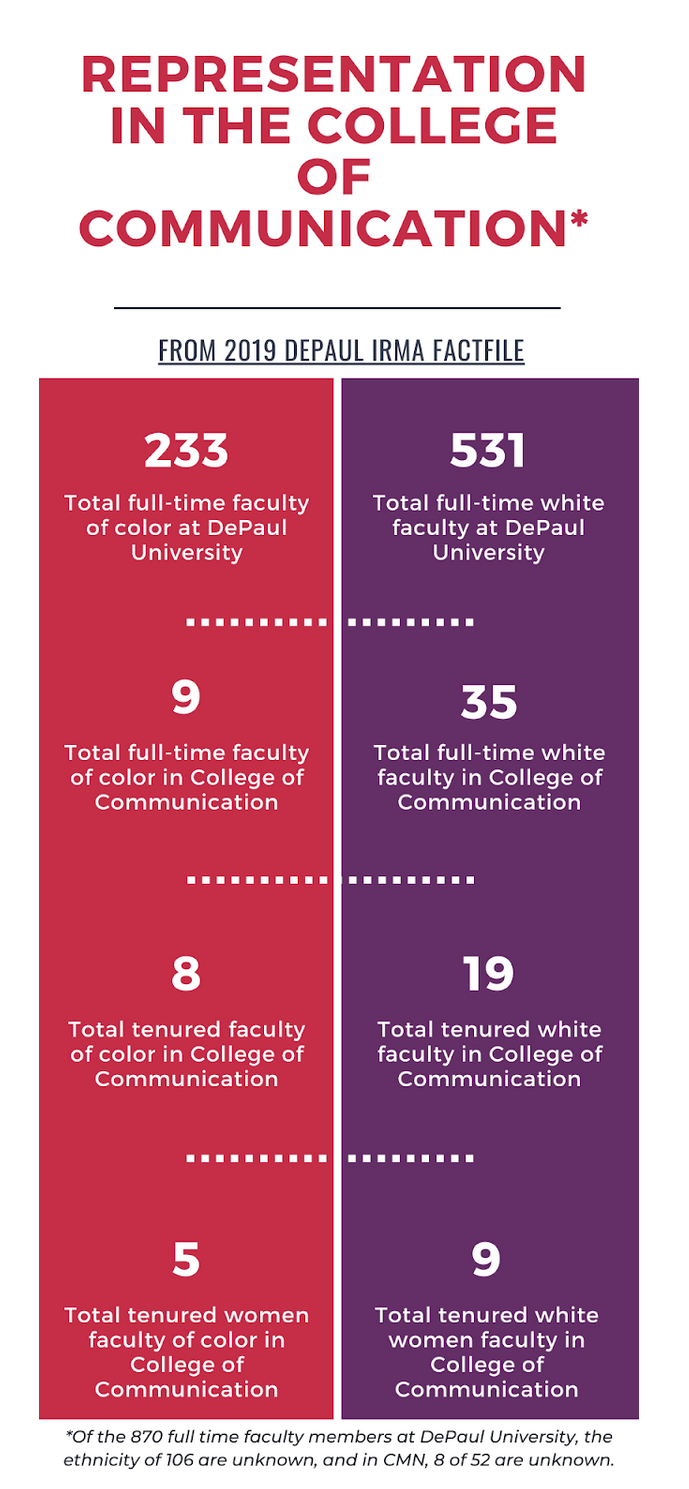
Graphic by Marin Scott, 14 East.
Mundel said in an email to 14 East that while there is a need for more faculty of color, it is a difficult task to accomplish, writing that “I have been a member of two faculty searches, and I can attest to those two committee’s efforts in making diversity a priority. Yet, sometimes it can become challenging to find a minority candidate whose research fits the job call.”
Escatel doesn’t believe this is a good enough reason; she said it’s a “cop out” and that there are ways of inviting scholars of color to apply to the program. Yet, retention of faculty of color is another issue.
“It is hard to retain faculty of color, it is not enough to just hire us,” Escatel said. “There are already things in place that are keeping us out or pushing us out. So we need more than just a hiring, a diversity hire, there needs to be structural changes in place that address the ways that people of color are kept out or pushed out.”
Calvente’s lawsuit stems from her own accounts of racial discrimination exhibited by College of Communication faculty. Calvente and Dillard filed a joint complaint “concerning patterns of racial harassment, bullying, marginalization, and microaggressions within the College” with then-dean Ghanem in 2018, according to the lawsuit. Ghanem pushed the concerns to DePaul’s human resources office. Dillard withdrew her complaint shortly afterward, while Calvente met with Isabel Diaz of the EEO office, though the Appeals Board wrote “the Appellant never followed up with a request for additional information from Isabel Diaz and that the case was closed in early 2019 due to the Appellant’s failure to respond to EEO requests.”
In a mass email sent to faculty, former and current students, Calvente mentioned claims of college faculty exhibiting racist and sexist behavior, writing that “a senior colleague making a joke at a College gathering and using the ‘N’ word as a punchline; a senior colleague who, at a different college function actually put on pornography on a karaoke screen for all of us to see, and jeered in my presence as well as the presence of other College of Comm. female faculty; a tenured colleague who directed her anger at me after I and other senior colleagues highlighted her use of racist undertones because she insisted I was the cause of her reprimand; the list goes on and on.”
In response to these claims, Foster, Booth, Murphy and Willard said that they did not witness nor could they corroborate them.
A Call to action
Despite input from university tenured faculty, the support of professors belonging to various academic institutions and an appeal ruling in favor of Calvente, President Esteban finally sided with the Provost and College of Communication, ending her employment at the university beginning June 30, 2020.
The loss of a favored professor hit many students of Calvente hard, causing a movement to better align DePaul’s tenure evaluation process with the needs of its students.
Similarly, that email from Calvente sparked Chauhan to co-found the Coalition for Racial Justice at DePaul University, a group of over 90 students, alumni and faculty participants that advocate for DePaul’s faculty of color who have experienced discrimination throughout their academic careers.
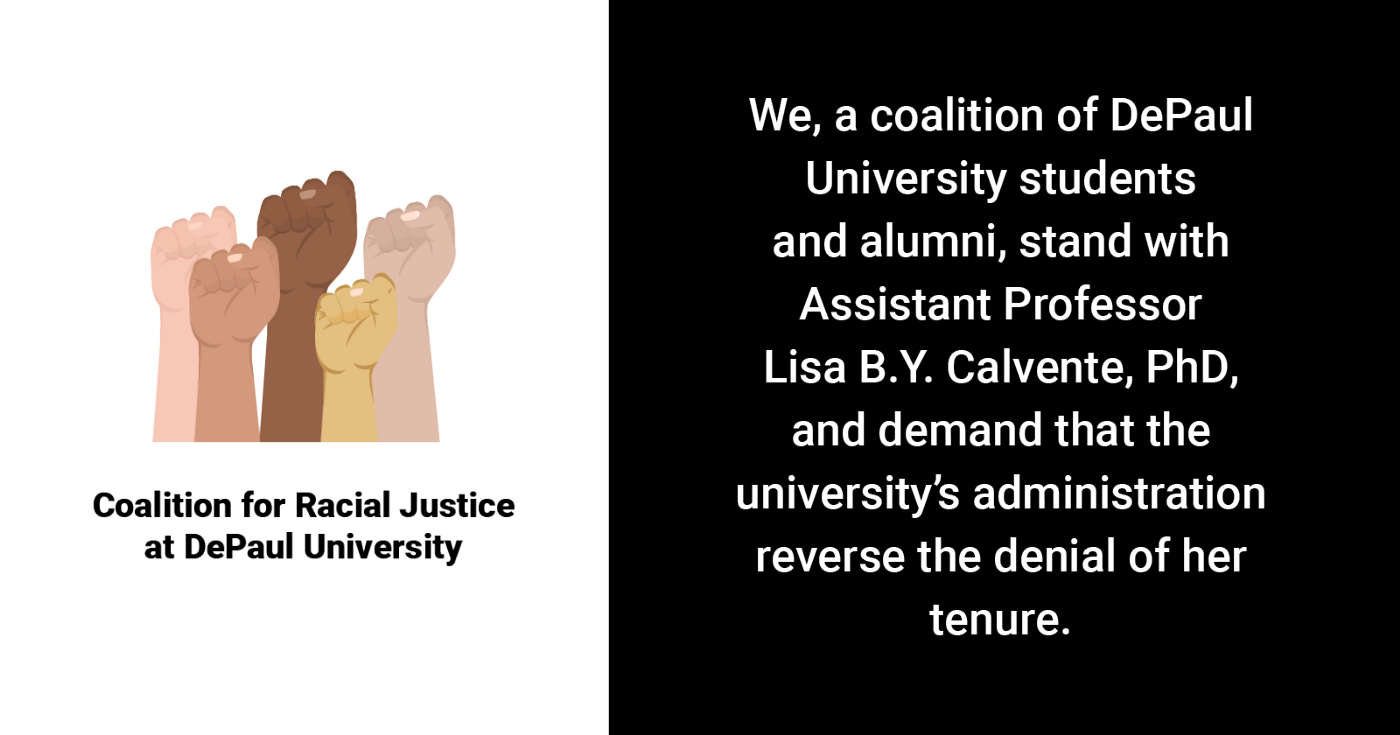
Image courtesy of Yesica Tellez
“While I am saddened by this, I’m in no way discouraged,” Chauhan said of Calvente’s dismissal. “As Calvente has expressed to us that this is not just about one person, it’s not just about one job. It’s a larger issue, and there are other teachers that are going through this right now and there are other teachers that will go through this in the future.”
Losing Calvente as a member of DePaul’s community has impacted not only students, but fellow colleagues as well.
“She contributed something to our college no other faculty member did and losing her is losing that,” De Moya said. “And I think her contribution is significant.”
Students like Stonebrook, Wilson, Adams, Tellez, Chauhan and May are not only demanding a change for Calvente, but a change in the entire tenure process, calling for more transparency and student involvement as it affects their learning opportunities and the education they pay for.
Wilson also called upon DePaul University to come to terms with its status as a predominantly white institution that she feels is only serving the educational needs of white students and faculty.
“Examine your overall academic curriculum career,” Wilson said. “What you have learned and what you have not learned, who you have seen in your book? Has whiteness always been the default? And once you take that examination of, is whiteness as the default or has one group always been the default, answer the next question of, are you okay with one group being the default in your entire academic career?”
All seven current and former students interviewed remarked that Calvente was not only an incredible professor, but a safe space for both their academic and personal lives. They felt she validated the voices and perseverance of those who feel unheard and ignored. For Tellez, this lesson is clear when she said:
“In her last moment, she’s still teaching us.”
Editor’s note: Meredith Melland and Marin Scott are both recent graduates of the journalism program in the College of Communication at DePaul University. Scott took Calvente’s CMN 103 class her sophomore year. All of the documents in this story, with the exception of the Faculty Handbook (included in the lawsuit), are published in full here.
Additionally, an earlier version of the story did not say that The DePaulia first reported the news of Calvente’s termination and lawsuit. We regret the omission.
Header image by Jenni Holtz, 14 East.




NO COMMENT